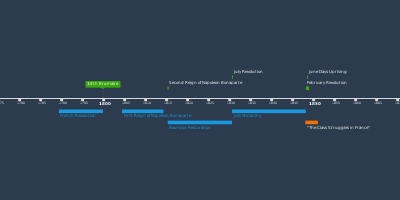dec 10, 1848 - Louis Bonaparte elected president
Description:
“10 December 1848 was the day of the peasant insurrection. The symbol that expressed their entry into the revolutionary movement, clumsy but cunning, rascally but naïve, oafish but sublime, a calculated superstition, a pathetic burlesque, an inspired but stupid anachronism, a momentous, historic piece of buffoonery, an undecipherable hieroglyph for the understanding of the civilized – this symbol bore unmistakably the physiognomy of the class which represents barbarism within civilization. The republic had announced itself to the peasants with the tax collector; they announced themselves to the republic with the emperor. Napoleon was the only man who had exhaustively represented the interests and the imagination of the peasant class, newly created in 1789. By inscribing his name on the frontispiece of the republic this class declared war abroad and the enforcement of its class interests at home. For the peasants Napoleon was not a person but a programme. They marched on the polling stations with banners flying, drums beating and trumpets sounding, shouting, ‘Plus d’impôts, à bas les riches, à bas la république, vive l’empereur.’ No more taxes, down with the rich, down with the republic, long live the emperor! Behind the emperor lurked the peasant war. The republic which they voted down was the republic of the rich.10 December was the coup d’état of the peasants, who overthrew the existing government. And from this day forth, having taken a government from France and given her a new one, their eyes were immediately fixed on Paris. Having once been the active heroes of the revolutionary drama they could no longer be thrust back into the inactive, acquiescent role of the chorus.
The other classes contributed to the completion of the peasants’ electoral victory. For the proletariat the election of Napoleon meant the removal of Cavaignac from office, the overthrow of the Constituent Assembly, the dismissal of bourgeois republicanism, the annulment of the June victory. For the petty bourgeoisie Napoleon represented the rule of the debtor over the creditor. For the majority of the big bourgeoisie Napoleon’s election represented an open breach with the party which it had temporarily had to make use of against the revolution but which became intolerable to it as soon as this class tried to consolidate the temporary situation as the constitutional position. Napoleon in place of Cavaignac represented for them the monarchy in place of the republic, the beginning of the royalist restoration, a tentative hint given to Orleans, the Bourbon fleur-de-lis concealed beneath the Bonapartist violets. Finally, the army, in voting for Napoleon, voted against the Mobile Guard, against the idyll of peace and in favour of war.”
p. 406-7
Added to timeline:
Date:
dec 10, 1848
Now
~ 177 years ago
